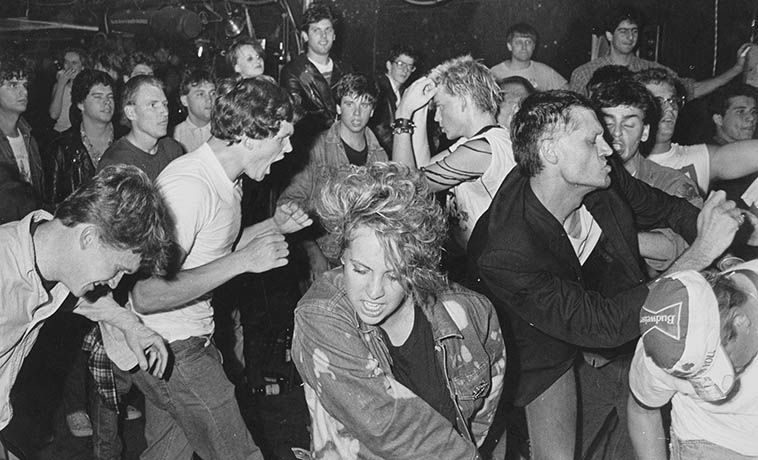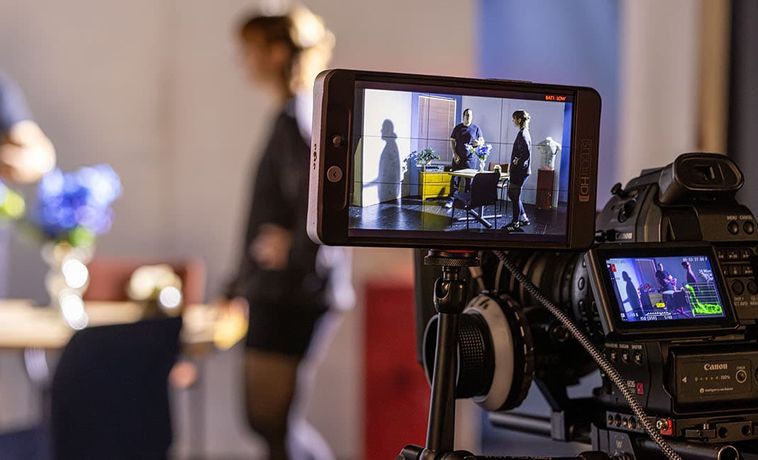
Lynn Asare-Bediako (left) and Lydia Evans founded BlackBox in 2023. Photo by Janice Checchio
Reel Diversity
BlackBox, a student-run film society and festival, creates opportunities for Black filmmakers at BU and beyond
Lynn Asare-Bediako stood before an audience of about 100 at Brookline’s Coolidge Corner theatre in September 2024 and proudly welcomed them to the second annual BlackBox film festival.
The event featured work by Black student film-makers from up and down the East Coast, from BU to the University of Florida, and Asare-Bediako, cofounder of the festival, offered a powerful introduction to their films. “Black voices are formidable, they’re vital, they’re beautiful, and, most of all, they’re undeniable,” she said. Referencing the many roadblocks that aspiring Black filmmakers face, she then paraphrased the rapper Kendrick Lamar: “Life will put many red lights in front of you, but sometimes you must push on the gas and trust God—and tonight, we’re pushing on the gas.”
The festival’s 10 short films were funny, sad, touching and shocking. A claymation short ended with a surprising joke. A tense black-and-white drama presented a dark take on artificial intelligence. And the final film, about an uncomfortable parent–teacher meeting, ended with a plot twist that left audience members gasping and cheering.
BlackBox is a Black film society, established in 2023 by Asare-Bediako (’25) and Lydia Evans (’25), and the festival is their biggest event. The classmates wanted to create a space to share ideas, develop skills and network outside the classroom, where they haven’t always been comfortable being their full selves. “I really wanted to make a club with Black voices and Black stories at the forefront, both in front of and behind the camera,” Asare-Bediako says.
Building A Black Space
A film and television major, Asare-Bediako was accustomed to being one of the only people of color in class and on set. “When I pitched ideas that pertained to my experience as a Black woman, there was always a lot of explaining that had to be done,” she says. She attended COM’s 2022 Black Media Symposium and heard alumni talk about student clubs they’d participated in—but there was no film club where Black experiences might be better understood.
So she created one.
Lack of diversity in film and television isn’t a problem unique to COM, higher education—or Hollywood. In the 96-year history of the Academy Awards, no Black filmmaker has won an Oscar for directing, cinematography or editing. Few have even received a nomination— in part because so few have filled those roles. A 2021 McKinsey & Company study found that fewer than 6 percent of the producers, writers and directors of US films were Black. Compounding the situation, Black talent was often shut out of projects unless a Black person held a senior role. For example, less than 1 percent of projects without a Black director had a Black writer.
Asare-Bediako shared her club idea with classmate Lydia Evans. “My first thought was that it was necessary,” says Evans. “Most of the stuff I’ve worked on, there weren’t many Black people. It can feel a bit isolating.”
They asked Tunji Akinsehinwa, an associate professor of the practice of production in film and TV and cinematography, to serve as a faculty advisor. They created an Instagram account and, in spring 2023, began holding events. They host film screenings and organize cinematography, sound and writing workshops for Black students. They held their first film festival, for Boston-area students, in 2023 and opened up the second one to the entire East Coast in 2024. They’ve also established events that they hope will improve diverse representation across COM’s film and television department. Akinsehinwa leads a series of workshops on how to properly light dark skin tones, and BlackBox organizes an annual people of color casting session, timed with the start of film projects for the college’s advanced production courses.
The efforts are already paying off, the founders say. They’ve noticed more people of color in classes and on-screen.
You can see the difference in student films, before and after. It’s cool that we have more space here now that BlackBox is a club.
Lydia Evans
The Producers
In spring 2024, BlackBox launched a club-supported film project. “The idea was that all of the heads would be Black people—Black director, Black producers, Black cinematographer,” says Evans. The club put out a call for pitches and chose an idea from club member Chanel Holguin. BlackBox financed the film, and members of the executive board filled the crew.
“When you’re a film major and you’re around people who have a lot more experience, it can be really scary to even want to join those places or to take certain classes,” says Evans. That, she adds, creates “an endless loop where, if you don’t have experience, people don’t want you on their crew, but then you can’t get experience.”
Holguin (’27) had joined BlackBox her first semester at COM and appreciated the community it provided. But she had never written a script or directed a film. “You’re putting yourself out there. It’s a very vulnerable process,” she says.
Her film, Estranged, tells the story of a middle-aged woman celebrating her daughter’s birthday while struggling with memories of a sister who had died at the same age. It’s based on the experiences of someone Holguin knows. Balancing her vision for the personal story with feedback from others was a new challenge, but the club made it possible, she says. “Having solid people there I knew I could trust is what really allowed this to flourish. I’m forever grateful to Lynn and Lydia because they put trust in me.”
Holguin finished editing Estranged in October 2024 and premiered it in December. As she works her way toward COM’s upper-level production classes, she has a newfound confidence. “It’s everything to me. I know that I can do it. I know that I’m capable of it.”
Evans, who served as an executive director on the film alongside Asare-Bediako, agrees. “BlackBox and the projects I’ve worked on have made me feel more confident in myself as a filmmaker and have taught me that you don’t have to be accepted for your experience to be valid,” she says. “I feel less of a need to make myself smaller or to fit in. I feel I can just exist.”
Ready For The Next Generation
After the applause died down and the theater lights came up at the Coolidge Corner Theatre in September 2024, Akinsehinwa thanked the audience. “Festivals like this [give] Black filmmakers the chance to showcase their work, their identity, and share their experience of the world,” he said. Then he pivoted to a row of eight Black women in the front of the theater—the club’s executive board. “[We’re here] because of the remarkable young women who got together almost two years ago to create something that would provide a better understanding of the lived experience of Black filmmakers,” he said, prompting more cheers.
Asare-Bediako and Evans say the two film festivals have been the highlight of the past two years. They’ve enjoyed seeing the reactions of the filmmakers who, in many cases, are sharing their work publicly for the first time.
When it comes to student films, you don’t always get to have a big audience. To have that for Black filmmakers was a really great experience.
Lynn Asare-Bediako
Akinsehinwa has pushed his students to think big about the club and festival—to grow them while also making them sustainable. Holguin has already agreed to step up as the next club president. The college has been consistently supportive of BlackBox. “Everything we’ve asked for, we’ve gotten,” Asare-Bediako says.
Although she won’t be around to meet them, Asare-Bediako has a message for the next generation of COM students: “If you’re Black and interested in filmmaking or in cinema, there is a space for you.”



